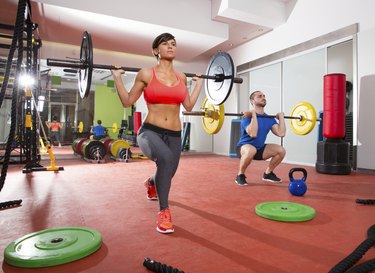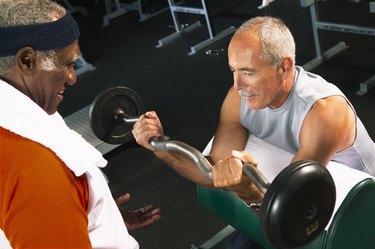
Bulking up and losing weight are two different goals that involve different paths for success. You can do both at the same time when you are first starting, but after you lose excess fat, you will no longer lose pounds when you are building muscle. Focus on building a routine that includes a strength-training program, regular cardio exercise and a good diet to meet your goals. You can alternate routines in cycles if you wish, bulking for a time period and then losing weight for a time period, but this is not always the healthiest way to get fit. Luckily, most fitness professionals recommend a mixture of strength training and cardio as the best way to be healthy.
Strength Training to Bulk Up
Video of the Day
Step 1

Perform a strength-training routine that consists of high weight and low repetitions for growing your muscles larger. You should push yourself with the amount of weight that you use so that you are physically not capable of doing more than eight to 10 repetitions of each exercise. Do two or three sets each time. While bulking, you should do your strength-training routine three to five times per week.
Video of the Day
Step 2

Do weight-training exercises for the upper body every other time that you lift. Good exercises include bench presses, biceps curls, standing overhead presses, chest and bent-over rows, lateral raises, lateral pull-downs, triceps extensions, triceps press-downs, cable curls and front raises.
Step 3

Alternate your lower-body routine with your upper-body routine. A good lower-body, strength-training routine includes exercises such as barbell squats, barbell lunges, deadlifts, leg extensions, leg curls, hip adductor and abductor exercises, calf raises and wall sits.
Step 4

Eat plenty of calories and drink lots of water. Bulking up requires eating enough calories to grow larger. The exact amount that you should eat depends on your height, weight and how often you work out. Your goal should be to eat more calories than normal during this time period, but you should still choose healthy foods that provide your body with essential nutrients.
Diet and Exercise to Lose Pounds
Step 1

Add regular cardio exercise to your weekly routine if you want to lose weight. Cardio helps you burn calories to lose those excess pounds and has many benefits for your health. Try for between 150 and 300 minutes per week of cardio exercise depending on whether you are doing moderate or vigorous workouts. Good examples of cardio include running, cycling, swimming and taking an aerobics class at the gym.
Step 2

Focus on healthy foods and the right number of calories for your body and fitness goals. If you want to lose weight, you need to eat fewer calories than normal. If you eat 500 fewer calories than you burn each day, you can lose approximately 1 pound per week.
Step 3

Choose foods that consist of lean proteins, whole grains, low-fat dairy products, healthy fats, and fruits and vegetables. Drink eight glasses of water each day.
Tip
Measure inches instead of pounds, as building muscle can add weight. You can also focus on the way you feel instead of stepping on a scale to measure your weight. If you are working out regularly and eating a healthy diet with the right number of calories, your body will change over time.